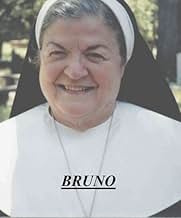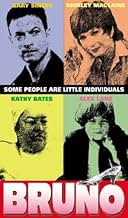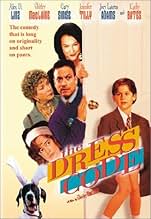IMDb RATING
6.0/10
1.6K
YOUR RATING
Bruno is a unique young boy genius, whose expression of his own individuality leads his family and community along an emotional journey.Bruno is a unique young boy genius, whose expression of his own individuality leads his family and community along an emotional journey.Bruno is a unique young boy genius, whose expression of his own individuality leads his family and community along an emotional journey.
- Director
- Writer
- All cast & crew
- Production, box office & more at IMDbPro
Storyline
Did you know
- TriviaLast film project for Gwen Verdon.
- GoofsAt the end of the film when Bruno is about to board the plane, he hugs multiple people over the shoulder. When the camera cuts to a different angle, he is seen hugging under the shoulder during what is supposed to be the same hug.
- Crazy creditsDuring the both the opening and the closing credits, Bruno can be heard reciting key words that pertain to the story, along with their definitions.
- ConnectionsReferences Apocalypse Now (1979)
- SoundtracksCeleste Aida
Performed by Rome Opera Orchestra & Jussi Björling
Written by Giuseppe Verdi
Conductor: Jonel Perlea
Featured review
This film seemingly attempts to take on a number of serious subjects, mostly relating to the rejection of people based upon characteristics which have nothing to do with their essential personality (e.g., weight, skin color, cross-dressing), and to send the message that being different is okay, and that friends accept friends the way they are (and that parents *should* accept their kids the way they are). But it treats these serious topics in such a superficial manner, it is hard to discern what lesson a kid might draw from this fim.
Make no mistake - this is a kid's film. It's rambling, somewhat incoherent presentation is not likely to hold an adult's interest. Yet it's subject matter is likely to dissuade many adults from letting their children watch. The film initially attracted my attention because the capsule summary surprised me (Something about a cross-dressing spelling champion at a Catholic school), and Kathy Bates usually gives strong performances. Her part is relatively small, and as it turns out it was the acting competence of Alex Linz which (to the extent possible) held the movie together.
My impression is that this film was, at least in some degree, inspired by the French film, "Ma Vie en Rose", which addresses the issue of a child's cross-dressing and gender identity in a very direct manner. Here, the American film-makers avoided any of the psychological implications behind cross-dressing behavior, and instead provided a very contrived explanation for the child's desire to cross-dress. While the French precursors to American films aren't always that appealing to American audiences, it is amazing to me that American filmmakers can squeeze all of the innovation - and all of the daring - out of those films as they remake them for American audiences.
If this film was intended to send the message of accepting people the way they are, some of the comments about this film, to me, highlight its failings. This wasn't a serious attempt to take on the subject of cross-dressing. Having worked as a divorce lawyer, I can tell you that this behavior is not as rare as some think - within the heterosexual community. This impression has been reinforced by discussions with professionals from hospital emergency rooms, who are in a unique position to observe some unusual choices of undergarment. Had this film been more daring, it would have presented cross-dressing in a realistic manner, rather than hiding behind a pseudo-religious, neutral excuse for the behavior.
While I can understand why an American studio executive would get nervous at the thought of addressing this subject head-on, I think the disingenuous treatment of the central focus of the film serves to undermine its message, and essentially turned this into a film without an audience. Shirley MacLaine was willing to hint at her subtext in the opening credits - "A film by (A film bi) Shirley MacLaine" - but didn't stand behind her convictions. Granted, had she done so, she still might have ended up with a film without an audience, but it may well have been a better film.
Make no mistake - this is a kid's film. It's rambling, somewhat incoherent presentation is not likely to hold an adult's interest. Yet it's subject matter is likely to dissuade many adults from letting their children watch. The film initially attracted my attention because the capsule summary surprised me (Something about a cross-dressing spelling champion at a Catholic school), and Kathy Bates usually gives strong performances. Her part is relatively small, and as it turns out it was the acting competence of Alex Linz which (to the extent possible) held the movie together.
My impression is that this film was, at least in some degree, inspired by the French film, "Ma Vie en Rose", which addresses the issue of a child's cross-dressing and gender identity in a very direct manner. Here, the American film-makers avoided any of the psychological implications behind cross-dressing behavior, and instead provided a very contrived explanation for the child's desire to cross-dress. While the French precursors to American films aren't always that appealing to American audiences, it is amazing to me that American filmmakers can squeeze all of the innovation - and all of the daring - out of those films as they remake them for American audiences.
If this film was intended to send the message of accepting people the way they are, some of the comments about this film, to me, highlight its failings. This wasn't a serious attempt to take on the subject of cross-dressing. Having worked as a divorce lawyer, I can tell you that this behavior is not as rare as some think - within the heterosexual community. This impression has been reinforced by discussions with professionals from hospital emergency rooms, who are in a unique position to observe some unusual choices of undergarment. Had this film been more daring, it would have presented cross-dressing in a realistic manner, rather than hiding behind a pseudo-religious, neutral excuse for the behavior.
While I can understand why an American studio executive would get nervous at the thought of addressing this subject head-on, I think the disingenuous treatment of the central focus of the film serves to undermine its message, and essentially turned this into a film without an audience. Shirley MacLaine was willing to hint at her subtext in the opening credits - "A film by (A film bi) Shirley MacLaine" - but didn't stand behind her convictions. Granted, had she done so, she still might have ended up with a film without an audience, but it may well have been a better film.
- How long is Bruno?Powered by Alexa
Details
Box office
- Budget
- $10,000,000 (estimated)
Contribute to this page
Suggest an edit or add missing content































